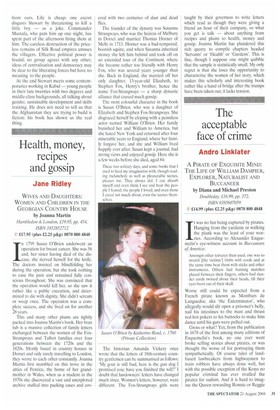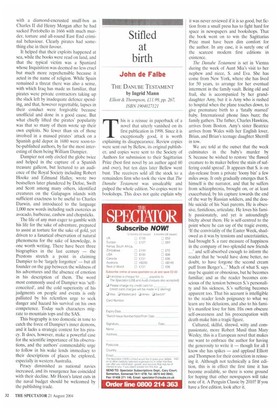The acceptable face of crime
Andric, Linklater
A PIRATE OF EXQUISITE MIND: THE LIFE OF WILLIAM DAMPIER, EXPLORER, NATURALIST AND BUCCANEER by Diana and Michael Preston Doubleday, £16.99, pp, 372, ISBN 0385607059 V £14.99 (plus £2.25 p&p) 0870 800 4848 It was no fun being captured by pirates. Hanging from the yardarm or walking the plank was the least of your worries. According to Alexander Exquemelin's eye-witness account in Buccaneers of America:
Amongst other tortures then used, one was to stretch [the victims] limbs with cords and at the same time beat them with sticks and other instruments. Others had burning matches placed between their fingers, others had slender cords twisted about their heads, till their eyes burst out of their skull.
Worse still could be expected from a French pirate known as Montbars de Languedoc, aka 'the Exterminator', who allegedly would slit open a prisoner's belly, nail his intestines to the mast and thrust red-hot pokers to his buttocks to make him dance until his guts were pulled out. Gross or what? Yet, from the publication in 1678 of the first among many editions of Exquemelin's book, no one ever went broke selling stories about pirates, or was thought the worse of for portraying them sympathetically. Of course tales of landbased lawbreakers from highwaymen to train robbers have always done well, but with the possible exception of the Krays no popular criminal has ever rivalled the pirates for sadism. And it is hard to imagine the Queen rewarding Ronnie or Reggie with a diamond-encrusted snuff-box as Charles II did Henry Morgan after he had sacked Portobello in 1666 with much murder, torture and all-round East End criminal behaviour. Clearly pirates had something else in their favour.
It helped that their exploits happened at sea, while the books were read on land, and that the typical victim was a Spaniard whose Inquisition was deemed no less cruel but much more reprehensible because it acted in the name of religion. While Spain remained a threat there was also a sense, with which Iraq has made us familiar, that pirates were private contractors taking up the slack left by inadequate defence spending, and that, however regrettable, lapses in their conduct were forgivable because unofficial and done in a good cause. But what chiefly lifted the pirates' popularity was that so many of them wrote up their own exploits. No fewer than six of those involved in a massed pirates' attack on a Spanish gold depot in 1680 were soon-tobe-published authors, by far the most interesting of them being William Dampier.
Dampier not only circled the globe twice and helped in the capture of a Spanish treasure galleon, but lectured to an audience of the Royal Society including Robert Hooke and Edmund Halley, wrote two bestsellers later plundered by Defoe, Swift and Scott among many others, identified creatures on the Galapagos islands with sufficient exactness to be useful to Charles Darwin, and introduced to the language 1,000 new words including such esoterics as avocado, barbecue, cashew and chopsticks.
The life of any man eager to gamble with his life for the sake of adventure, prepared to assist at torture for the sake of gold, yet driven to a fanatical observation of natural phenomena for the sake of knowledge, is one worth writing. There have been three biographies in the last century — the Prestons stretch a point in claiming Dampier to be 'largely forgotten' — but all founder on the gap between the wildness of his adventures and the absence of emotion in his description of them. The word most commonly used of Dampier was 'selfconceited', and the cold superiority of his judgments on people and events is only palliated by his relentless urge to seek danger and hazard his survival on his own competence. Today such characters migrate to mountain tops and the SAS.
This biography is too domestic in tone to catch the force of Dampier's inner demons, and it lacks a strategic context for his piracy. It does, however, make a powerful case for the scientific importance of his observations, and the authors' commendable urge to follow in his wake lends immediacy to their descriptions of places he explored, especially in western Australia.
Piracy diminished as national navies increased, and its resurgence has coincided with their decline. Mr Hoon's latest cuts in the naval budget should be welcomed by the publishing trade.



























































 Previous page
Previous page